Meet your objectors
Page 45

If you've noticed an error in this article please click here to report it so we can fix it.
• It is surprising how many people still believe that, under proposed legislation, an operator's licence will be made available automatically on application to the LA. This is not so. An operator's licence (or quality licence) will not only be subject to approval by the LA, after need has been proven, but the applicant may also be confronted by objectors.
Applications will in almost every instance be published, as they are today, and will be open to objection. Perhaps here I could make a plea. Could all traffic areas please be directed to publish Applications and Decisions—or whatever it may be called— to the same format. This at least Would make life fractionally easier for all concerned. Might it not also be better to publish one omnibus edition rather than one for each traffic area?
Not all applications will be published, however. The one exception is that made by an operator holding a licence in another area—but only then if the LA is satisfied that a grant will not result in a substantial increase in the number of vehicles already authorized to the applicant.
It is an established practice for many solicitors to object to any application which appears to impinge on the conditions of a licence held by their clients. This practice at least seems doomed and few will mourn its passing.
Objections at the moment are submitted by operators, who are required to show that they have spare capacity. If the Transport Bill becomes law, this right will disappear, since of the many types of objections provided for, none may be made directly by an operator.
The passing of the Act would herald the appearance of a new type of objector. In terms of Section 59, objections could be made by associations whose members are operators; trade unions whose members are employed by operators; local authorities; and a chief officer of police. This is a formidable list and successful applicants will certainly have earned the right to make a living in transport if they satisfy all these sections of the community.
The type of objection visualized in Section 59 is vastly different from those we have become used to. Operator objections will now be made by the appropriate association.
Which associations are competent to make an objection? The two which spring readily to mind are, of course, RHA and TRTA and if these were the only two, then, despite it appearing to be unfair to those not in membership, at least it would be tidy.
But this is not the case: all associations whose members are, or are employed by, operators can object. This must therefore include the Transport Association, the NAFWR, the Co-operative Transport Managers Association, the Sand and Ballast Merchants Association, the NFU . . . the list is never ending. In fact, the scope is alarming, because the association title does not always indicate a transport connection. What of the Association of British Chambers of Commerce and all those bodies representing sections of trade and industry?
In addition to these trade associations objections can be lodged by professional associations such as the ITA, IoTA, Institute of Transport, IRTE—plus others who have no immediately identifiable connection with transport in their title. The proposal is that the associations' membership must consist of or include operators or their employees. Include means one!
The same wide scope is given to trade unions. Again we think quickly of TGWU, SCMU, URTU and NUR. But what of NALGO, NUC, USDAW and so many others? As in the case of the associations, they need have no obvious connection with road transport, but just a member who is employed by an operator.
There can be little complaint about the inclusion of a chief of police as an objector. Much of today's enforcement work might not have materialized if the police had been given the right to object in the past. The very fact that the police can object will be sufficient in many cases to ensure legitimate operation. It is significant that they come second to trade unions.
The final category of objector is the local authority, and this means, in England and Wales, a county, borough, or an urban district council, the GLC or the Common Council of the City of London. In Scotland it means a county or town council. Local authorities, being comprised of paid officers and elected members, could provide formidable opposition to an application.
Generally speaking, councils can be guided by the clerk but it is the elected members who have the final say. These members come from all walks of life, and have differing shades of political opinion. They may be housewives or lorry drivers, retired men or practising professional people. As individuals they can be almost anything other than convicted felons. Collectively, they are potential objectors to an operator's licence.
To summarize, great play has been made of the fact that the NFC and BRB are the only objectors to a quantity licence. It is more important to realize that before getting that far, an application may have to survive the searching scrutiny of hundreds of others. Objectors can be any association or trade union whose members are, or are employed by, operators, the chief of police or the local authority. The onus of proof of the objecton lies with the objector.
In the next in this series I shall be dealing with clause 60: how does the LA decide?




































































































































